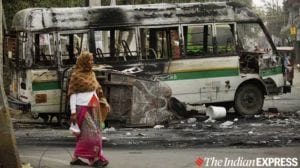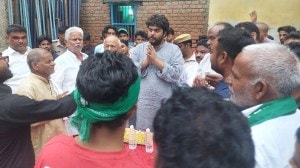Poetic injustice
A function to honour litterateurs was nothing unusual. It is the least a more than half illiterate nation can do to make up for it. The s...

A function to honour litterateurs was nothing unusual. It is the least a more than half illiterate nation can do to make up for it. The surprise was an odd and dreary person like me being invited by the patron minister as well as renowned Urdu poet Kaifi Azmi to a programme planned in honour of poets (who are believed to be colourful people). The two poets selected for a joint homage — as dissimilar as Mohammed Iqbal and Mahadevi Varma — did meet the usual requirement of linguistic balance, but left an ignoramus like me wondering how their respective poetic contributions were interlinked.
A reference to Iqbal’s song which is on everybody’s lips, Sare Jahan Se Achha Hindostan Hamara, appeared to me the best bet for a safe start. But whenever I hear that song, I can’t help being reminded of the contradiction apparent in the love for the motherland this song overflows with and his later history. “Here,” he proclaims, while “Greece, Egypt and Rome have been wiped off the face of earth, we are stillaround. There is something which has sustained us despite the hostility of centuries!” If he were physically with us, it would have been apposite to request him to say what that “something” is.
But after admiring his National Song of Hindustani Children in which he defines his own mother country as the one which “amazed the Greeks, educated the world, in which Nanak sang about the oneness of the Lord, and Chishti spread God’s message”, what staggers one is his Cheen-o-Arab Hamara, Hindostan Hamara, Muslim hein ham, watan hai sara jahan hamara (China and Arabia are ours, so is Hindustan, we are Muslims and the whole world is our motherland).
Much more than this is the contradiction in the spirit of his patriotic composition with the fact that he demanded the partitioning of the country as the “final destiny of the Muslims”. Syed Shahabuddin took the trouble of contradicting me, saying he wanted “a Muslim-majority state in the west within the Indian federation” and “did not even think ofEast Bengal and Assam”.
In Quaid-e-Azam Jinnah’s Correspondence, however, another Syed (Sharifuddin Pirzada of Pakistan) introduces Iqbal as the “spiritual founder of Pakistan who presided over the 21st session of the All India Muslim League, Allahabad, in 1930, demanding an independent Muslim state.” Also in a letter in 1937 to Jinnah, Iqbal speaks of Muslims as a “nation entitled to self-determination” — which very well includes Bengal. Though the occasion in Lucknow did not permit me to dwell at length on this, I kept wondering at the propriety of bracketing Mahadevi Varma with this personage. One incident of her life has been recorded by two gentlemen — the chief editor and assistant editor of a new magazine (Kshirayani), who called on her to request her to perform the dedication ceremony of the journal. She received them warmly and, directing a maid to get some sweets for them, enquired about the purpose of their visit. When she learnt the programme was proposed for August 15, 1979, sheexcitedly asked, “Why that date?” “Since our country attained freedom on that day,” she was told.
“Whose country became free on that day?” she flared up. “Yours?” Her bright face was suddenly overshadowed with distress and her eyes became moist. In a half-choked but affectionate voice, “You should be having an answer, son, but you don’t. You have given an answer which the well-read, so-called scholars and politicians, or ordinary men give. But you are poets, have you accepted the freedom which has descended upon the dismembered bosom of Mother India?” On another occasion, she mourned: “what will Chhayavad (the Hindi poetry of which she is one of the three great pillars) do? Of what consequence will our poetry be? Or any of our sensitivities? These insensitive power-hungry folks have destroyed its culture.”
One could not easily think of any two poets more dissimilar to be dubbed together than Iqbal and Mahadevi! Poetic license, did you say?



- 01
- 02
- 03
- 04
- 05




























